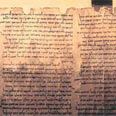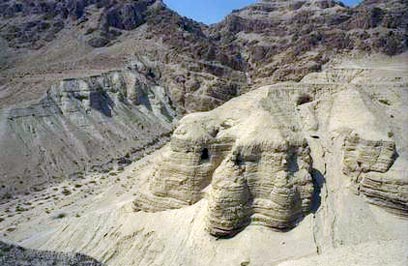
Jordan has complained to the United Nations in a bid to acquire the Dead Sea Scrolls from Israel, saying the Jewish state seized the ancient texts during the 1967 Six-Day War, an official said on Monday.
"The kingdom has filed a complaint to UNESCO that the scrolls belong to Jordan," Rafea Harahsheh of the country's antiquities department said in a statement.
"The government has legal documents that prove Jordan owns the scrolls."
Harahsheh did not say when the kingdom, which signed a peace treaty with Israel in 1994, filed the complaint to the United Nations Educational, Scientific and Cultural Organization.
The scrolls, some of which are as old as the third century BC, were part of a display at Toronto's Royal Ontario Museum in Canada that ended on Sunday.
"We have been trying our best to restore our stolen antiquities, including the scrolls. Stealing our antiquities violates international treaties and ethics," Harahsheh said.

Qumran caves, where scrolls were found (Photo: Moshe Milner, GPO)
"Israel seized the scrolls and other antiquities from the Palestinian Museum, which was managed by Jordan, in east Jerusalem when it occupied this part of the city in 1967."
Jordan has asked Canada to seize the scrolls, invoking the 1954 Convention for the Protection of Cultural Property in the Event of Armed Conflict, to which the two countries are signatories.
"So far, Canada has reservations. We are still studying our options," Tourism and Antiquities Minister Maha Khatib told AFP, without elaborating.
A Canadian foreign ministry spokesman told AFP earlier this month that "it would not be appropriate for Canada to intervene" in differences between Jordan and Israel over the scrolls.
In April, top Palestinian officials called on Canadian Prime Minister Stephen Harper to step in to cancel the exhibition.
In a letter to Harper, they argued that the texts were acquired illegally after Israel annexed east Jerusalem.
The parchments have shed light on the earliest origins of Judaism and Christianity, and are considered to be one of the greatest archaeological finds of all time.
Also called the Qumran manuscripts, the scrolls, attributed to the Jewish Essenes religious community, are of huge historical interest, especially for biblical scholars.
The first fragments were discovered in arid caves along the shores of the Dead Sea by a Bedouin shepherd in 1947.
"The Bedouins sold them to a group of Syrian Christians. They gave the scrolls to their Orthodox bishop, who took them to the United States in 1948," Harahsheh said.
Israel's antiquities authority has said Israel is the rightful custodian of the Dead Sea Scrolls.















